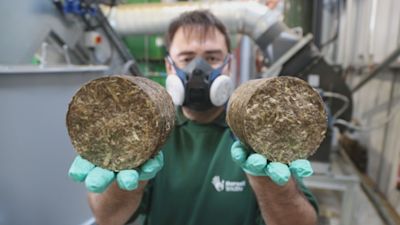Zoo first in UK to turn animal waste into re'poo'able energy

Video report by ITV News Meridian's Kerry Swain
Marwell Zoo near Winchester in Hampshire is the first wildlife park in the UK to generate renewable energy using animal waste.
700 tonnes of dung, soiled bedding and leftover hay will help power the zoo's new tropical house.
Poo from endangered species such as Grevy's zebra and the Somali wild ass will generate heat using biomass technology.
It is all part of plans for the conservation charity to become carbon neutral in 2022.
Dr Duncan East, Head of Sustainability said: "Using heat in this way from our own animals is unique in the UK and as far as we know across the world.
"The urgent need to reduce the burning of fossil fuels and leave these high carbon sources in the ground means we can't act soon enough to replace the oil-fired heating systems in these buildings
"Previously 600 tonnes of animal waste was taken off-site to be composted, and this came with a significant carbon transport cost.
"We came up with the idea of biomass heat generation to reduce our carbon footprint and turn a previous waste stream into a valuable resource, achieving cost savings in the process."
Zookeepers sweep up the zoo poo from the animal paddocks and enclosures each morning before a mini refuse truck collects the waste and transports it to the Energy Centre.
A digger transfers the mixture of manure and bedding to a shredder for mixing, before it is then dried and pressed into briquettes, which are fed into the boiler.
The boiler produces hot water, which is fed into a 15,000-litre thermal store, before flowing underground to heat the zoo's latest exhibit, its 'Energy for Life: Tropical House', which combines the tropical animal habitat with educational exhibits on energy flow, climate change, and powering modern lifestyles.
The animals including a Linne's two-toed sloth, free-flying tropical birds and crocodile monitor lizards as well as its lush tropical plants benefit from the warm, humid environment.
The next phase of the biomass system is to provide heat to other buildings across the zoo and will benefit the okapi, primates in 'Life Among the Trees' and Marwell staff who work in Grade 1 Listed Marwell Hall.
Dr East, said: "Replacing oil fired heating system with heat generated from waste from our own animals will hugely reduce our carbon footprint, and what better way than to make use of a material which is in abundant and continuous supply."